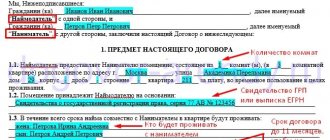What is a rental agreement?
Is it possible to rent an apartment without a contract? It must be understood that such an action will be illegal: the law stipulates that a rental agreement for residential premises is concluded in writing (Article 674 of the Civil Code of the Russian Federation). In addition, the absence of an agreement makes both parties more vulnerable, since oral agreements, not recorded anywhere, are easy to break.
Rental agreement
A rental agreement is a document confirming the provision by the owner of the apartment (landlord) to the other party (tenant) of residential premises for a certain fee for possession and use with a limited period of time and other conditions. Interestingly, it is not necessary to notarize such an agreement, however, if the parties wish, this is possible.
The content of the agreement depends on the wishes of the parties - what the employer and the lessor want to fix (except for those cases when the presence of a certain condition is prescribed by law - Article 421 of the Civil Code of the Russian Federation).
Features of concluding an apartment rental agreement between individuals
The agreement is drawn up in writing, at least in two copies (for each of the parties). It can include “non-standard” items if they are relevant for the tenant or owner of the apartment (for example, if they will live in the apartment with an animal, you can separately indicate what the owner’s responsibility is for damage caused by the pet).
Residential rental agreement
Residential rental agreement No.
g.
"" g.
Citizen, passport (series, number, issued), hereinafter referred to as "
Lenter
", on the one hand, and citizen, passport (series, number, issued), hereinafter referred to as "
Tenant
", on the other hand, hereinafter referred to as "
Parties
", have entered into this agreement, hereinafter referred to as the "Agreement", as follows:
SUBJECT OF THIS AGREEMENT
1.1. The Landlord provides the Tenant with premises consisting of a room (in a room apartment) located at the address for a fee, for temporary use for residential purposes.
1.2. The premises belong to the Landlord on the basis.
1.3. During the entire rental period, the following will live in the apartment together with the Tenant:
1.4. The rental period for the specified premises is set from "" year to "" year.
1.5. If the parties agree, the term of the Agreement is extended independently.
RIGHTS AND OBLIGATIONS OF THE PARTIES
2.1. The lessor undertakes:
- Provide the specified premises to the Tenant from "" year.
- Provide the Tenant with free access to the premises;
- Visit the premises no more than once a month, notifying the Tenant at least 24 hours before the intended visit;
- When the Tenant leaves, it is mandatory to return the amount of the guarantee payment (deposit) upon compliance by the Tenant with clause 1.4; 2.2; 3.2; 3.7, 3.8; 3.9.
2.2. The employer undertakes:
- Use this premises only for the purpose specified in clause 1.1.
- Do not sublease the premises and do not transfer the rights of use to third parties, and do not accommodate other persons without the consent of the Landlord;
- Obtain written permission from the “Landlord” to keep animals in the apartment, while the “Tenant” bears full responsibility for damage caused to the apartment by his pets;
- Do not carry out alterations or re-equipment without the written permission of the Landlord;
- Do not install any equipment (replacing locks, lock cylinders, strengthening doors, installing alarms, etc.) without the prior consent of the Landlord;
- Assume full financial responsibility in the event of your absolute fault for renting or using this residential premises and for all possible consequences of this rental or use, excluding force majeure circumstances arising in accordance with clause 5.2;
- Take full financial responsibility for all property transferred to him and located on the premises, keep it in good condition and clean;
- Comply with fire safety rules;
PAYMENTS AND SETTLEMENTS
3.1. The monthly payment for the use of the premises is rubles.
3.2. In the future, payments will be made monthly, then no later than the date of each current month.
3.3. As a guarantee payment (deposit), the Tenant paid an amount in the amount of rubles.
3.3.1. The following shall be considered as a guarantee payment (deposit): (cross out the excess):
— Advance rent for the last month of residence, subject to the Tenant’s compliance with clause 1.4; 2.2; 3.7; 3.8; 3.9.
— Security deposit returned by the Landlord upon expiration of the period of stay, subject to the Tenant’s compliance with clause 1.4; 2.2; 3.7; 3.8; 3.9.
3.4. At the time of signing this Agreement, the Tenant transferred to the Landlord an amount in the amount of rubles.
3.5. The rent amount cannot be changed without written agreement of both parties.
3.6. Utility payments are carried out.
3.7. Payment for long-distance, international, mobile telephone calls, and other paid telephone services, including the Internet, is paid by.
3.8. The subscription fee for using the telephone line is paid by.
3.9. Electricity is paid by the Tenant.
RESPONSIBILITY OF THE PARTIES
4.1. In case of early termination of employment and termination of this Agreement, each party is obliged to notify the other party no later than thirty calendar days before the date of the expected termination of employment.
4.2. Early termination of employment and termination of this Agreement is possible in cases of violation by the Landlord or Tenant of their obligations under this Agreement.
4.3. In the event of early termination of this Agreement at the initiative of the Lessor, earlier than the specified expiration date, due to his personal, unforeseen circumstances, but subject to the Lessor's compliance with all of his obligations specified in clauses 1.4; 2.2; 3.2; 3.7; 3.8; 3.9, The Landlord undertakes to return to the Tenant part of the previously paid payment for the use of the residential premises for the time actually not lived, as well as the deposit (clause 3.3), while the Landlord is obliged to allow the Tenant to live in the apartment for fifteen calendar days in excess of the paid period on a free basis.
4.4. In the event of early termination of this Agreement at the initiative of the Tenant, but subject to compliance by the Landlord with all its obligations specified in paragraphs 1.4; 2.1; 3.5, advance rent for unlived, prepaid days is not returned to the Tenant.
4.5. For late payment of rent, the Tenant pays penalties based on % of the overdue amount for each day of delay. In case of delay in payment for more than ten days, the Lessor has the right to terminate the Agreement unilaterally
4.6. The parties mutually checked personal documents and documents confirming the right to dispose of this apartment.
4.7. The Landlord confirms the consent of the persons registered or having the right to dispose of this apartment with the terms of this Agreement, and also that this premises has not been sold, not mortgaged, is not the subject of a legal dispute and is not under arrest.
4.8. The parties confirm that they are familiar with all the terms of this Agreement, fully agree with them and are personally responsible for their compliance.
SPECIAL CONDITIONS
5.1. If disputes arise that are not provided for by the terms of this Agreement, the Lessor and the Tenant resolve them independently by mutual agreement or in the manner prescribed by law.
5.2. In the event of force majeure circumstances, namely: the introduction of martial law or a state of emergency, natural disasters, changes in current legislation that make it impossible for the parties to fulfill their obligations under this Agreement or significantly affect their fulfillment, as well as other force majeure, the parties are not liable for the fulfillment of its obligations under this Agreement.
5.3. Listed in paragraph 1.3. of this Agreement, persons living together with the Tenant bear all obligations for its execution on an equal basis with the Tenant.
5.4. This Agreement is drawn up in copies having equal legal force, one for each of the parties.
ADDITIONAL TERMS
Electricity meter readings on the date of entry.
DETAILS AND SIGNATURES
Landlord
- Registration address:
- Mailing address:
- Phone fax:
- Passport series, number:
- Issued by:
- When issued:
- Signature:
Employer
- Registration address:
- Mailing address:
- Phone fax:
- Passport series, number:
- Issued by:
- When issued:
- Signature:
What must be included in a long-term apartment rental agreement?
The contract must indicate the surnames, first names and patronymics of the parties, as well as the details of the document that confirms the identity. The rental price is also specified in the contract - this will avoid conflict situations regarding changing the amount or excuses in case of impossibility to pay.
Hire object
The contract specifies the address of the housing that is being rented, as well as the area, number of floors (if we are talking about a house), and location on the site. It is important that this data coincides with the real ones, that is, you need to record the information that has been double-checked. These parameters help to unambiguously determine the subject of the contract, so you should not forget about this point.
Margin
If there is a guarantee deposit, its size and the conditions under which the employer receives the money back must also be specified in the contract. One of the most common situations is when the owner of the property, when the tenant moves out, tries by hook or by crook to find a reason not to return the deposit. To prevent this from happening, be sure to write down the conditions under which you will receive your money back. If there are any shortcomings in the apartment before moving in (breakdowns, defects in coatings, broken items, etc.), they need to be recorded, preferably with photographs, and the list attached to the contract, so that later you will not be blamed for their appearance.
An inventory of property when renting out an apartment will also be useful: the contract will indicate what is in the apartment, and the owner will not be able to demand anything that does not exist from you.
Other expenses
The owner and tenant agree who pays utility costs (or each party bears part of the costs). This also needs to be stated in the contract. If this is not specified, by default the responsibility to pay utility bills lies with the tenant.
It would also be a good idea to write down who is doing the repairs and how this expense is compensated if the repairs fall on the shoulders of the tenant (except in cases where the repairs are necessary to eliminate deficiencies that arose due to the fault of the person living in the apartment). The same can be said regarding expensive purchases for the home (furniture, appliances, etc.).
Your responsibility
Ideally, the tenant should deliver the property in the same condition as it was when he moved in. In practice, of course, this is almost impossible when it comes to long-term stays. But you need to understand that before moving out, the apartment must be put in order, as close as possible to what it was. That is, you eliminate the shortcomings and breakdowns that arose through your fault yourself. Otherwise, your guarantee fee will not be returned. The owner can also sue, and if the contract provides for this, you will be obligated to bring the apartment into proper condition.
Additional nuances
Those people specified in the contract have the right to live in the apartment. Minor children live with their guardians or parents - according to Art. 679 of the Civil Code of the Russian Federation, when moving in minor children, the landlord’s consent is not required (but to avoid unnecessary questions and conflict situations, it is, of course, better to tell about the presence of a child in advance). If you have animals, you must inform the apartment owner about this before concluding a contract so that he can make an informed decision about renting out the property.
The rental agreement for residential premises is concluded for a period not exceeding five years. If the contract does not specify a term, the contract is considered to be concluded for five years. If the contract is concluded for a period of less than one year, then it is considered a short-term hire.








